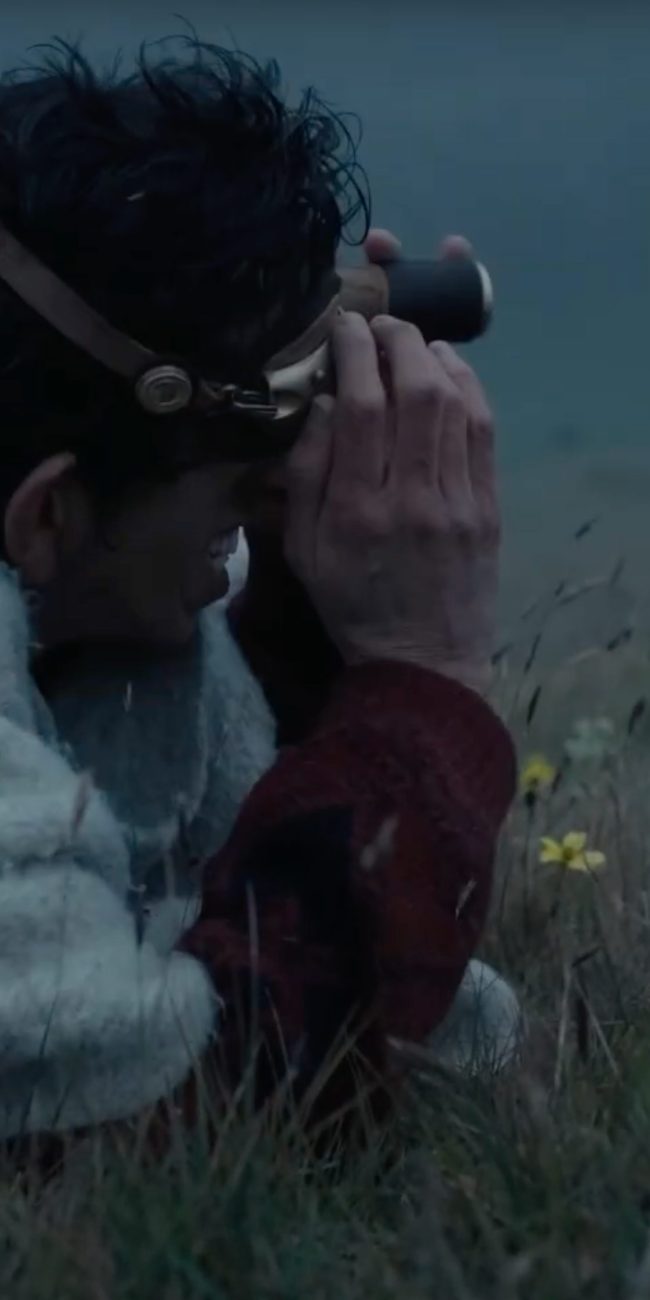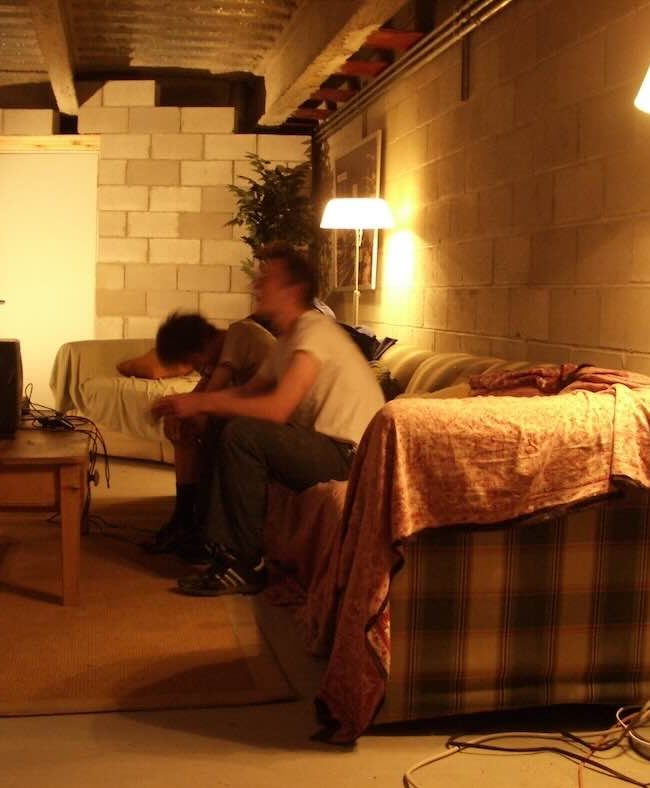A Conversation with Nathaniel Kahn (THE HUNT FOR PLANET B)
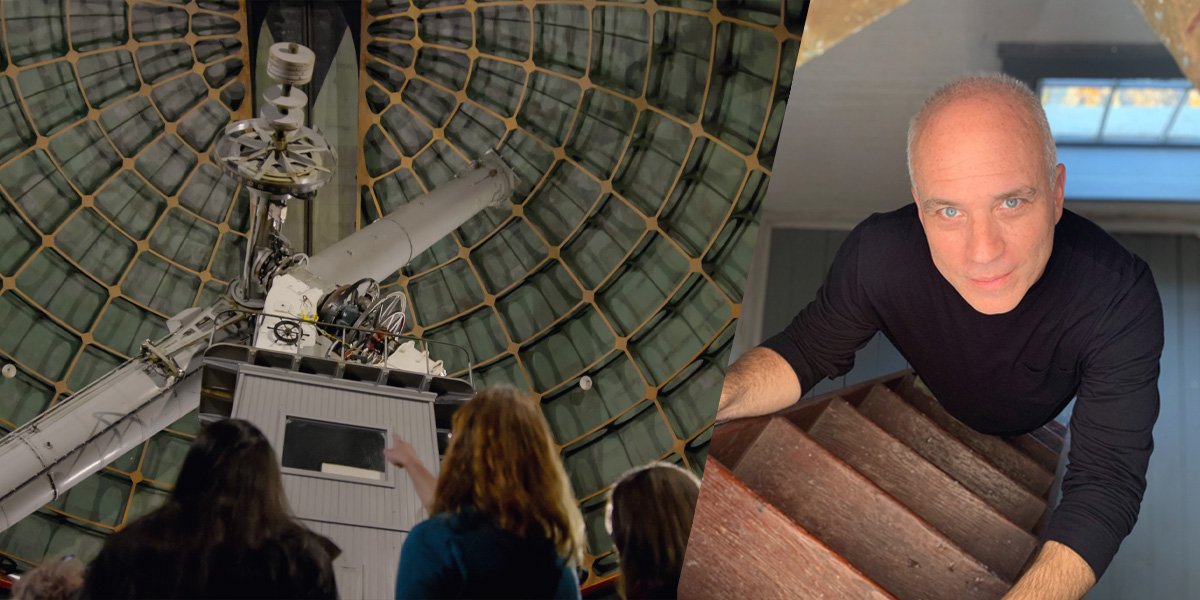
The James Webb Space Telescope (JWST), successor to the Hubble Space Telescope and $10 billion joint NASA, the European Space Agency and the Canadian Space Agency project is finally ready to launch in October 2021, after twenty-five years. “It’s been a long time in coming,” says Nathaniel Kahn director of The Hunt for Planet B (reviewed here by Chris Reed) Kahn’s new documentary premiered at SXSW and combines the long, hard road for the telescope, with the search for exoplanets and our oncoming climate crisis that may force us to escape Earth for ‘Planet B.’ Like his brilliant last documentary, The Price of Everything, Kahn makes Planet B about people, expertly weaving together disparate strands to present the audience with a story that manages to feel high stakes despite progressing at a generational piece. At its heart, it’s a film about love (no, stay with me here) – a team’s love for their work, a species’ love for their planet (or sometimes the lack of it), and our love for each other, which spurs us on into the unknown.
I had a chance to speak with Kahn a few days before the premiere.
Hammer to Nail: So you’ve been documenting the building of Webb for more than five years, does that mean that you were working on it prior to being done with your last film? Were you filming two things simultaneously?
Nathaniel Kahn: Yeah. I mean, the thing about this Telescope is, it’s like one of the great building projects of the past, like building some cathedral or something like that, you know what I mean? It’s almost multi-generational. One of the joys and the horrors too of being a documentary filmmaker is sometimes you have to stick with something for a long time. But in the end, it is a joy when you can watch something happening over a period of time because you also, if you’re making a film about people, you’re seeing them change. And you’re really seeing people grow and people manage to persist and stick with something. And there’s something deeply inspiring about that.
HtN: And I assume even their thinking about it changed.
NK: So, yeah, when the telescope first began, the purpose of it is to look at the very early universe to look at the first stars and galaxies. And when this telescope was first imagined, we didn’t even know that there were planets beyond the solar system.
HtN: Oh, we knew.
NK: Okay. You did. You had the intuitive sixth sense for it, but the scientists didn’t know.
HtN: I mean, but like keep saying in the film, if there’s this much space and then there’s this planet here, like there has to be. And that would be the argument that I have made all my life. Well, there has to be other life out there. There has to be other planets out there. It’s just a matter of finding them.
NK: And way back in the ancient Greek times, Epicurus said, “There must be other worlds out there just like ours,” but we had no way of actually finding out. And that’s the thing that is so amazing. People just don’t stop to think about it. But hopefully, the film does get you to think about it, that when you look up at the night sky now, you realize that every single star you see has at least one planet around it. And many of them have many planets like ours. And we really did not know that just a decade ago. So when you assimilate that, one of the things that I feel is, this has changed the night for me. I look up and it’s somehow different, something has shifted. And that’s very recent.
HtN: So I just have to ask, is there life out there?
NK: Well, okay. There are two answers to that. Do I think there is, sure. It seems like the numbers and the statistics absolutely favor that. And yet we don’t know for sure. The intuitive part of me says, “Of course there is, how could we be so special? How could we be so provincial as to think that with all that space out there and all those hundreds of billions of stars and hundreds of billions of galaxies, how could we possibly think we’re the only living beings in this vast universe?” And yet, as of now, that’s all we know. We don’t know anything different. So the intuitive part says, of course, there’s other life out there.
HtN: And the other answer?
NK: The part of me that is the skeptic, or that has a scientific bent, says, “Well, we don’t know,” and we could be alone. Because there’s also the other possibility, and we entertain it in the film, which is that the number of things that had to go right on this tiny, wonderful planet for there to be life is also really, really complex, the numbers of things that had to be right for us to get here. It’s also probably a very, very small number. So it’s possible that we are alone. I mean, it’s something we don’t know. But the incredible thing is, we are on the verge of finding out. And one of my greatest hopes for this film is that it helps us to have, in some way, the collective will to keep looking and to keep searching and to find the best in human nature, which is to not give up, but keep looking until we find the answer.
HtN: Is that what got you interested in telling the story? It’s just funny, because I’m thinking about The Price Of Everything and it’s very like in the weeds of something that you can hold and then trying to figure out what value does this have…and to move on to something unknowable and you’re trying to bring it into what’s actually happening in front of it. So it’s like a reverse.
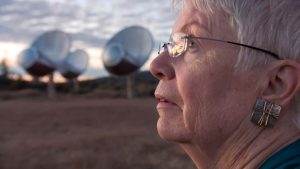
A still from THE HUNT FOR PLANET B
NK It’s true. Although at some level, art and science are both about wonder and beauty. I mean, to me, I’m enthralled by art and I’m also enthralled by the mysteries of space. I mean, it’s the mysterious things in life that I find most fascinating. Ever since I was a kid I’ve been fascinated by the stars and saw the moon through a telescope as a little kid and was just completely grabbed by it. And of course, always wondered, are there others out there? I remember, obviously, reading about Carl Sagan and reading Contact and just being fascinated in reading science fiction stories. The incredible thing is we’re at the moment now where science fiction isn’t isn’t fiction anymore. It’s here, it’s right now. So I guess it’s the wonder and the beauty that connects the art and the science. And on some level, it’s related to the same thing in human beings. We’re intrigued by the something that doesn’t exist that we want to find out about. And I think both science and art are at a fundamental level. They’re about investigation of the unknown, reaching out into the unknown.
HtN: I love that. So you got to touch a lot of different people working on this. What can you tell me about the different ways they look at what they’re doing? It feels like, they can’t all be doing it for the same reason. For some people, it’s a job, right? For other people, it’s like some sort of religious experience, right?
NK: Well, I mean, as a filmmaker, I’m interested in intense people. People who are extreme in one way or another. And actually, I mean, I think that pretty much everybody that is in this film, they’re all really passionate about what they’re doing. It’s a mission. It’s a passion. It’s something that is in their heart and in their soul. And in that sense, I guess, that’s another way in which it’s like the art too, right?
I mean, an artist is somebody, you have to really want to do it because it’s hard. And I think one of the things that surprised me about the scientists, and in this way they’re different from artists, and that’s that a scientist has to be willing, or an engineer has to be willing, to work on something that they may not see the end of. And they have to be willing to pass it on to the next generation without necessarily seeing it fully realized even in their own lifetimes. That’s something that is difficult. There’s something really, really beautiful in that. And I think there’s something important for us to learn as human beings about that. And the example of seeing this project coming together, there’s something that we need to learn right now. I think our species in general, that we have to be thinking about not just this moment, but how do we build structures and things and solve problems that will benefit the future?
HtN: I think that you really touch on that when you’re talking about climate change in the film, that idea of something that’s bigger than us, that maybe can’t be fixed instantaneously, but it’s still something you have to pursue.
NK: Yeah. I’m so glad you bring that up because I actually haven’t talked about this yet, so I’m so glad to talk about it with you. When you make a film like this, I didn’t know that it was going to go towards the climate change angle when we started it. And the great thing about documentary filmmaking is things happen and they intersect with the production process that suddenly resonate in these interesting ways that you didn’t anticipate. And so realizing, as we were making this film, the things that really started sticking in my head is when Jill Tarter says this idea that it’s unclear, that Jill Tarter says it and also Maggie Turnbull says it. “Can we survive the emergence of technology?”
It’s like this irony that, at this very moment, that we are able to ask the big questions, “Are we alone in the universe,” and actually able technically to find out. We are also facing this question of, “Gee, we’re actually changing our environment. Can we long survive?” That irony is a really, really interesting one. So suddenly when that began to come up a bunch of times with different characters in the film and in different ways.
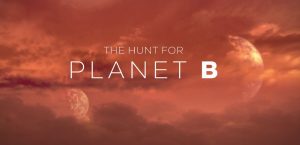
THE HUNT FOR PLANET B title card
HtN: Like the different human species (homo erectus, homo habilis), they all went extinct as soon as they came in contact with us, right? And I thought like, “Oh, well, we may become extinct in contact with us through the technology we’re creating.”
NK: No. You’re obviously right, beautifully said. And that’s Nick Lane, who’s in the film, wonderful evolutionary biologist who talks about that. This idea that human beings, we have a violent history and a violent present. So this question of the best of human nature is pushing us towards these really big questions. How do we get it together? How do we learn how to survive? And then to see that during the time of making this film, that the young people of this planet were getting together and saying, “Look, we have to deal with the future for our planet. And if you guys, if your generation is not going to deal with it, we need to deal with it.” And to see these young people marching in the streets of New York with their signs saying, “There is no planet B.” It just felt like this somehow has to be part of the film because the biggest realization is that by looking outwards, by asking about these other worlds, we’re suddenly thrown back on ourselves saying, “Well, gee, all these things we’re looking for out there, we have them right here.” We just have to learn how to recognize how remarkable that is.
HtN: Exactly. It was surprising in the most wonderful way when this very extra-terrestrial film become so terrestrial. I think it comes from your ability to see the human connection in there. I think you tell human stories and if it’s going to be a film about a telescope, you’re going to find the way to make it actually about the way two humans find each other.
NK: I mean, that’s marvelous. You’ve said it better than I’ve ever said it. I mean, but that really is it too, is that I wanted to make a science film that wasn’t about the science, but that is about the people who do the science and that is about human beings and why we even pursue science. So ultimately, you’re right. It’s the human stories that I’m drawn to. One looks for these larger macro things that resonate with world events, or with the things that are happening in the world. And then one also, of course, looks for things that happen with characters and things that unfold in their lives. I mean, without giving too much away, there is a love story in the middle of this film. And that is something that was very surprising to me. I mean, those things also somehow mesh with the larger questions of, “Are we alone,” because as Amy Lowe, the engineer says, “We’re a lonely species.” And this question of human loneliness, it’s part of the reason that we reach out into the dark and say, are there others out there? And it’s also the reason why we reach for each other.
HtN: Right. It’s not really a film about a telescope, it’s about the people behind that incredible effort. People who were willing to work long enough that they might not get to see the full fruit of their labor.
NK: This is what Matt Mountain says in the film, and he’s referring to what Carl Sagan said, which is, “It’s going to have to be a better version of ourselves that will get to the stars.” And I like to think we’re on the way to finding a better version of ourselves. We’ve got to because the wonders of the future await us and it won’t be you and I who go, but it will be others. And I hope for a much more together world, and if it is a more together world and we decide on these big ideas and projects together, we can do it. I mean, human race is incredible, so it’s possible, we have to want it.
– Bears Rebecca Fonté (@BearsFonte)








